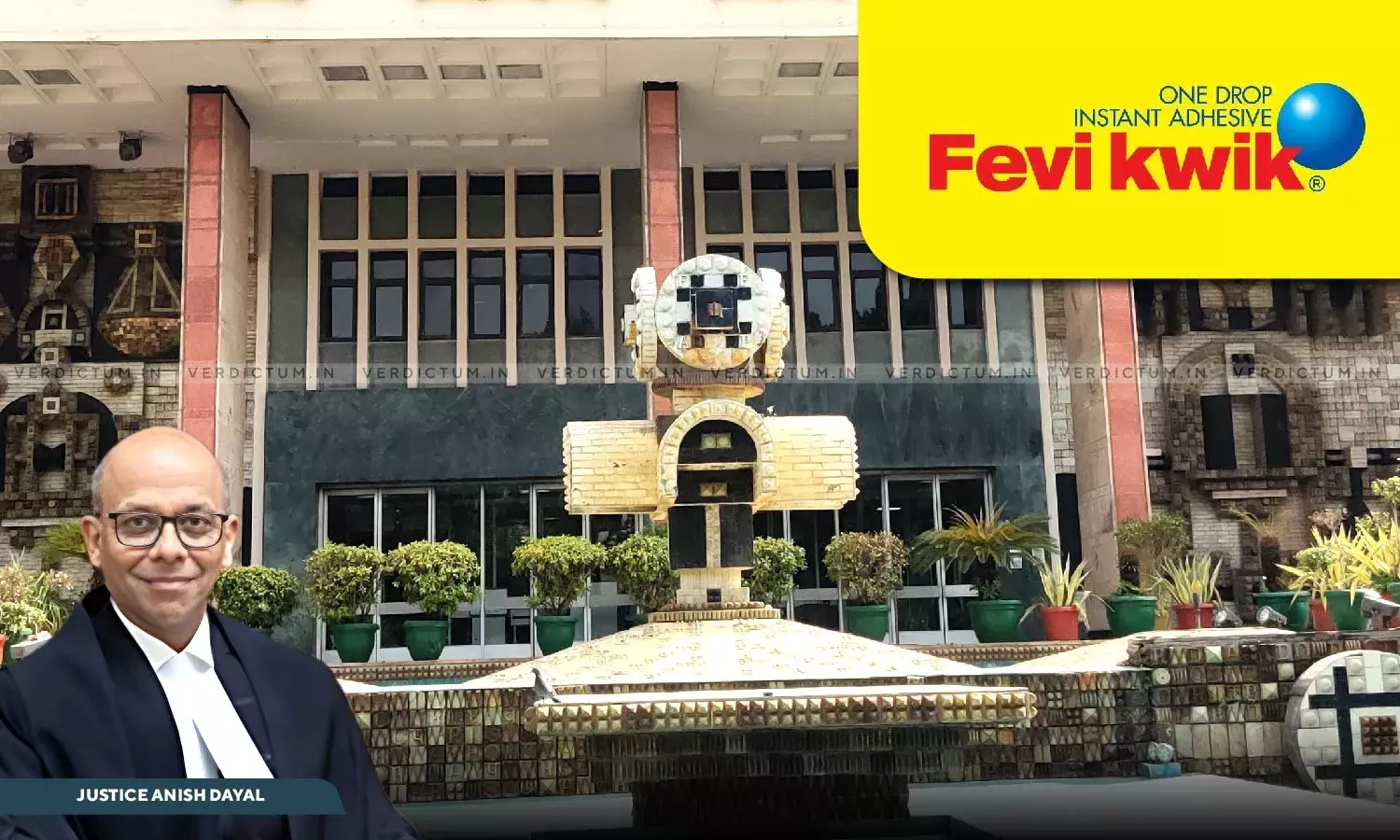Cannot Have Monopoly Over Mark ‘Kwik’ & All Its Variations: Delhi HC Refuses To Remove Trademark Of ‘Kwikheal’ In Plea Filed By ‘Fevikwik’

The Delhi High Court refused to remove or cancel the trademark of ‘Kwikheal’ in a plea filed by ‘Fevikwik’, saying that it cannot have a monopoly over a mark ‘Kwik’ and all its variations.
Pidilite Industries Ltd. had filed a rectification application under Sections 47 and 57 of the Trade Marks Act, 1999 for removal or cancellation of the ‘Kwikheal’ mark in the Register of Trade Marks.
A Single Bench of Justice Anish Dayal observed, “… even though the petitioner has a statutory right in its registered mark ‘FEVIKWIK’, it does not confer an exclusive right over part of the mark in ‘KWIK’. Moreover, this was the express limitation imposed by the Registrar of Trademarks. Having no such exclusive right on ‘KWIK’ there cannot be a right of rectification against ‘KWIKHEAL’. In any event, rectification sought is of the respondent’s device mark which, as noted above, has distinctive dissimilarities. The petitioner cannot have monopoly over the mark ‘KWIK’ and all its variations.”
Advocate Manish Dhir appeared for the petitioner while Advocate Mrinal Litoria appeared for the respondents.
In this case, the matter for cancellation of respondent mark was initially filed before the Intellectual Property Appellate Board (IPAB) and transferred to the High Court, consequent to the abolition of IPAB in 2021. The mark of which removal was sought, ‘POMA-EX KWIKHEAL’ (device) was applied for in October 2011 and the same was granted in December 2014. The petitioner’s products are sold under well-known trademarks ‘FEVIKWI’, ‘FEVICOL’, ‘FEVISTIK’, ‘FEVICRYL’, ‘FEVI BOND’, ‘FEVIART’, ‘FEVIGUM’, ‘FEVITITE’, ‘M-SEAL’ and ‘DR. FIXIT’, et al. The petitioner’s products are claimed to have been developed through in-house research and sold internationally, however, in particular, the products sold under the aforementioned marks enjoy a major market share in India.
The petitioner, therefore, claimed copyright ownership in respect of the trademark ‘FEVIKWIK’ with its distinctive packaging and claimed that the moment it came to know of the respondent’s infringing products using trademark ‘KWIKHEAL’, it filed a suit in the Bombay High Court. The High Court granted an ad-interim injunction against the respondent which was made absolute in 2017. Later, the respondent changed the packaging and was using a new device on the packaging. It was this device in which the registration was obtained and was challenged by the petitioner.
The High Court in the above regard noted that the new mark departed and moved away from the petitioner’s mark and packaging in the following aspects:
i. The trade name ‘POMA-EX’ has been prominently displayed on the top of ‘KWIKHEAL’ thereby distinguishing itself from the ‘FEVI’ range of brands;
ii. It does not use the blue and yellow pattern which is used by the petitioner for its trade dress, instead it uses a combination of red, green, black, and yellow;
iii. The placement of the wording on the said label is different from the petitioner’s device/packaging;
iv. New artwork including the red, green, and blue circles are used on the left and right sides of the main label;
v. The device displays an animated man, dressed in red and green, holding the product out of which a drop of adhesive is displayed to be falling out, hinting at the nature of the product;
vi. The descriptive image of the product is in a cylindrical shape, whereas the plaintiff’s product displays a different contoured shape with a dropper which can be twisted to break open.
Considering the fact that the rectification is sought of the device mark and that on a comparative assessment of the device mark of the petitioner and that of the respondent, when viewed as a whole, has apparent dissimilarity, the Court held that the two marks cannot be said to be deceptively similar.
“It has been held in M/S South India Beverages Pvt. Ltd. v. General Mills Marketing Inc. & Anr. 2014 SCC OnLine Del 1953 that in comparing device marks they have to be taken as a whole and not dissected. The ‘anti dissection rule’ therefore applies to the impugned mark and the application of rule has been articulated well in M/S South India Beverages Pvt. Ltd (supra)”, it added.
The Court further observed that the common and dominant part of this mark is ‘FEVI’ which is suffixed with a sub-brand depending on the nature of the product and that the recall, therefore, of a customer is on the basis of the ‘FEVI’ family of marks and not the sub-brand forming part of the suffix.
“The fact that respondents registered device mark has the word ‘KWIK’ as part of ‘KWIKHEAL’ would not estop the respondent from claiming commonality in the word KWIK. It is acceptable that a part of a distinctive mark may have a common element and comparisons are therefore insulated from a portion of the mark applying the ‘anti-dissection Rule’. Even if qualified by the ‘dominant mark principle’, KWIK would certainly not be the dominant portion of the marks of the petitioner. It is already noted above that ‘FEVI’ is by far the dominant part of the petitioner’s marks”, it also noted.
The Court concluded that the petition for rectification has to stand on its own legs and not take the crutch of the Bombay High Court’s prima facie findings in a suit for infringement/passing off against the respondent’s earlier packaging, now superseded by a new device/packaging. It said that the petitioner never opposed the registration of the respondent’s new device, which was granted after the Bombay High Court injunction, despite the suit being still pending.
Accordingly, the High Court dismissed the rectification petition.
Cause Title- Pidilite Industries Ltd. v. Sanjay Jain & Anr. (Neutral Citation: 2024:DHC:2369)
Appearance:
Petitioner: Advocate Manish Dhir
Respondents: Advocate Mrinal Litoria, CGSC Harish Vaidyanathan, Advocate Srish Kumar Mishra, Alexander Mathai Paikaday, Lakshay Gunawat, and Krishnan V.


